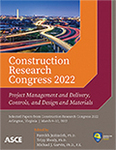Investigating Financial Risks Associated with Public–Private Partnerships for Transportation Project Delivery
Publication: Construction Research Congress 2022
ABSTRACT
Public–Private Partnerships (PPP) provide an avenue to deliver transportation infrastructure projects when public funding is limited. The financial mechanism is a significant component of PPP projects due to the infusion of private investment into public projects. The literature on PPP and its development is substantial, whereas funding and financial assessment has received less attention and examination. The research presented in this paper was an investigation of the financial risks in PPP projects through a literature review, survey, and follow-up interviews. Financial risks associated with PPP projects include inappropriate financial structure, tedious determination of private entity creditworthiness, high-procurement costs, operation and maintenance costs inaccurately estimated, risk of capital renewal cost due to inaccurate estimates, incorrectly predicting key performance indicators, inability to sustain a revenue stream during the concession period, intervention of the public entity in cost predictions, and inefficient revenue risk sharing mechanisms. The practical application of this study is valuable to both contractors considering PPP investment, and owners/public entities mitigating risk associated with contractor tendering. By identifying these risks, construction companies are able to anticipate financial risks for PPP projects to strategize remedial actions.
Get full access to this article
View all available purchase options and get full access to this chapter.
REFERENCES
Ashuri, B., and Mostaan, K. (2015). “State of private financing in development of highway projects in the United States.” Journal of Management in Engineering, 31(6), 04015002. doi:https://doi.org/10.1061/(asce)me.1943-5479.0000362.
Ashuri, B., Kashani, H., Molenaar, K. R., Lee, S., and Lu, J. (2012). “Risk-neutral pricing approach for evaluating bot highway projects with government minimum revenue guarantee options.” Journal of Construction Engineering and Management, 138(4), 545–557. doi:https://doi.org/10.1061/(asce)co.1943-7862.0000447.
Associated General Contractors. (2021). Public-Private Partnerships (P3s) Overview. Retrieved from: https://www.agc.org/public-private-partnerships-p3s-overview.
Bao, F., Chan, A. P., Chen, C., and Darko, A. (2018). “Review of public–private partnership literature from a project lifecycle perspective.” Journal of Infrastructure Systems, 24(3), 04018008. doi:https://doi.org/10.1061/(asce)is.1943-555x.0000424.
Binder, S., Perez, B., Mallela, J., and Sadasivam, S. (2017). Concept Design for an Online Information Source for Major Surface Transportation Projects: A Discussion Paper., Federal Highway Administration, June, pp. 57, New York.
Bing, L., Akintoye, A., Edwards, P., and Hardcastle, C. (2005). “The allocation of risk in PPP/PFI construction projects in the UK.” International Journal of Project Management, 23(1), 25–35. doi:https://doi.org/10.1016/j.ijproman.2004.04.006.
Carlile, J. L. (1994). “Private funding of public highway projects.” Proceedings of the Institution of Civil Engineers - Transport, 105(1), 53–63. doi:https://doi.org/10.1680/itran.1994.25707.
Casady, C., and Geddes, R. (2016). Private participation in US infrastructure: The role of PPP units. SSRN Electronic Journal. October. https://doi.org/10.2139/ssrn.3306259.
Currie, B., and Chambers, S. (2014). “Public-private partnership projects: Current policies, future potential, best practices and common pitfalls.” Proceedings from the AGC/CFMA Construction Financial Management Conference, Las Vegas, NV., November 5-7.
Design-Build Institute of America. (2019). Public-Private Partnerships: A Design-Build Done Right Primer.Retrieved from https://dbia.org/wp-content/uploads/2018/05/Primer-Public-Private-Partnerships.pdf.
Esmaeeli, A. N., and Heravi, G. (2019). “Real options approach versus conventional approaches to valuing highway projects under uncertainty.” Journal of Construction Engineering and Management, 145(11), 04019068. doi:https://doi.org/10.1061/(asce)co.1943-7862.0001711.
Ghorbani, A., Ravanshadnia, M., and Nobakht, M. B. (2014). “A survey of risks in public private Partnership highway projects in Iran.” Proceeds from 2014 International Conference on Construction and Real Estate Management, Kunming, China, September 27-28. https://doi.org/10.1061/9780784413777.058.
Heravi, G., and Hajihosseini, Z. (2012). “Risk allocation in public–private partnership infrastructure projects in developing countries: Case study of the Tehran–Chalus toll road.” Journal of Infrastructure Systems, 18(3), 210–217. doi:https://doi.org/10.1061/(asce)is.1943-555x.0000090.
Jang, W., Yu, G., Jung, W., Kim, D., and Han, S. H. (2018). “Financial conflict resolution for public-private partnership projects using a three-phase game framework.” Journal of Construction Engineering and Management, 144(3), 05017022. doi:https://doi.org/10.1061/(asce)co.1943-7862.0001442.
Jeihani, M., James, P., Saka, A. A., and Ardeshiri, A. (2015). “Traffic recovery time estimation under different flow regimes in traffic simulation.” Journal of Traffic and Transportation Engineering (English Edition), 2(5), 291–300. doi:https://doi.org/10.1016/j.jtte.2015.08.001.
Ismail, K., Takim, R., and Nawawi, A. H. (2011). “The evaluation criteria of value for money (VFM) of public private partnership (PPP) bids.” Proceedings from the 2011 International Conference on Intelligent International Conference on Intelligent Building and Management, 5, Singapore.
Ke, Y., Wang, S., Chan, A. P., and Lam, P. T. (2010). “Preferred risk allocation in China’s Public–private partnership (PPP) projects.” International Journal of Project Management, 28(5), 482–492. doi:https://doi.org/10.1016/j.ijproman.2009.08.007.
Kumar, L., Jindal, A., and Velaga, N. R. (2018). “Financial risk assessment and modelling of PPP based Indian highway infrastructure projects.” Transport Policy, 62, 2–11. doi:https://doi.org/10.1016/j.tranpol.2017.03.010.
Linder, S. H. (1999). Coming to terms with the public-private partnership. American Behavioral Scientist, 43(1), 35–51. doi:https://doi.org/10.1177/00027649921955146.
Ruiz-Nuñez, F., Harris, C., Kasper, H., Timusheva, E., Wei, Z., and Wilson, L. (2016). The state of PPPs: Infrastructure Public-Private Partnerships in Emerging Markets and Developing Economies. Public-Private Infrastructure Advisory Facility, World Bank Group Public-Private Partnerships. June. Retrieved from: https://ppiaf.org/documents/3551/download.
Shi, L., Li, W., and He, Y. (2020). “An incentive analysis of availability payment mechanism in PPP projects.” IEEE Access, 8, 106046–106058. doi:https://doi.org/10.1109/access.2020.2999932.
Information & Authors
Information
Published In
History
Published online: Mar 7, 2022
Authors
Metrics & Citations
Metrics
Citations
Download citation
If you have the appropriate software installed, you can download article citation data to the citation manager of your choice. Simply select your manager software from the list below and click Download.
